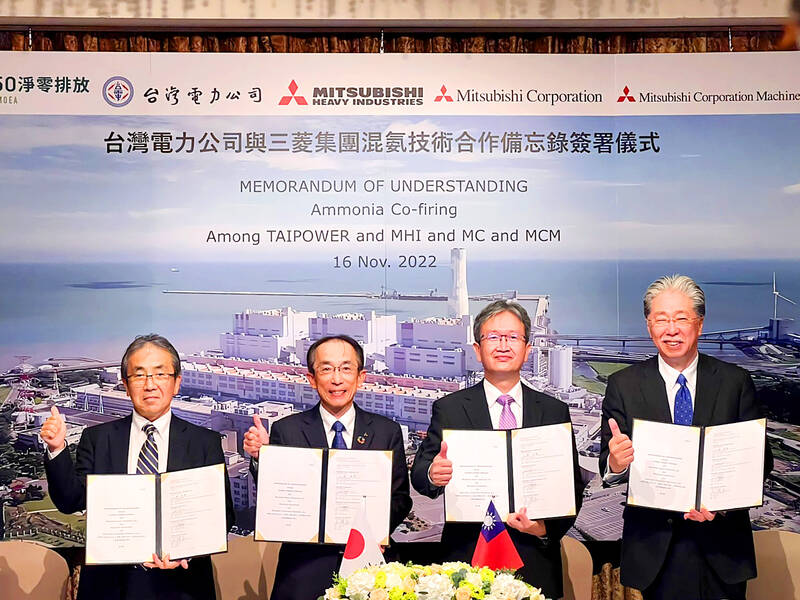State-run utility Taiwan Power Co (Taipower, 台電) yesterday signed a memorandum of understanding (MOU) with Japan’s Mitsubishi Group to conduct a demonstration project that involves mixing ammonia with coal to generate power at the Linkou Power Plant (林口發電廠) in New Taipei City.
The project aims to achieve 5 percent cofiring of ammonia at the coal-fired plant by 2030 before increasing the use of ammonia to 20 percent, Taipower spokesman Wu Chin-chung (吳進忠) said.
If the 5 percent ammonia cofiring target is reached, it is expected to help the power plant reduce its carbon emissions by 9,000 tonnes per year, Taipower said.

Photo: Lin Jin-hua, Taipei Times
Emissions reduction in the power sector plays an important role in Taiwan’s efforts to reach its goal of net zero emissions by 2050.
Taipower continues to promote a coal-to-gas shift at coal-fired plants — which includes burning ammonia with coal — energy storage technologies and sources of renewable energy, Taipower president Wang Yao-ting (王耀庭) said during the signing ceremony.
Toshiyuki Hashi — chief executive officer of gas power at Mitsubishi Hitachi Power Systems Ltd, a power solutions brand — said that Taiwan and Japan face common challenges in fuel imports and development of renewable energy sources, adding that he believes through collaboration, the two countries can effectively foster and accelerate an energy transition.
Hiroki Haba, chief operating officer at Mitsubishi Corp’s Next Generation Fuels & Petroleum business division, said that the group plans to spend ¥1.2 trillion (US$8.6 billion) to develop next-generation energy technologies.
As part of that approach, Mitsubishi Corp is seeking to make the ammonia-coal cofiring technology used in the demonstration project with Taipower more cost competitive, Haba said.

‘SWASTICAR’: Tesla CEO Elon Musk’s close association with Donald Trump has prompted opponents to brand him a ‘Nazi’ and resulted in a dramatic drop in sales Demonstrators descended on Tesla Inc dealerships across the US, and in Europe and Canada on Saturday to protest company chief Elon Musk, who has amassed extraordinary power as a top adviser to US President Donald Trump. Waving signs with messages such as “Musk is stealing our money” and “Reclaim our country,” the protests largely took place peacefully following fiery episodes of vandalism on Tesla vehicles, dealerships and other facilities in recent weeks that US officials have denounced as terrorism. Hundreds rallied on Saturday outside the Tesla dealership in Manhattan. Some blasted Musk, the world’s richest man, while others demanded the shuttering of his

Taiwan’s official purchasing managers’ index (PMI) last month rose 0.2 percentage points to 54.2, in a second consecutive month of expansion, thanks to front-loading demand intended to avoid potential US tariff hikes, the Chung-Hua Institution for Economic Research (CIER, 中華經濟研究院) said yesterday. While short-term demand appeared robust, uncertainties rose due to US President Donald Trump’s unpredictable trade policy, CIER president Lien Hsien-ming (連賢明) told a news conference in Taipei. Taiwan’s economy this year would be characterized by high-level fluctuations and the volatility would be wilder than most expect, Lien said Demand for electronics, particularly semiconductors, continues to benefit from US technology giants’ effort

ADVERSARIES: The new list includes 11 entities in China and one in Taiwan, which is a local branch of Chinese cloud computing firm Inspur Group The US added dozens of entities to a trade blacklist on Tuesday, the US Department of Commerce said, in part to disrupt Beijing’s artificial intelligence (AI) and advanced computing capabilities. The action affects 80 entities from countries including China, the United Arab Emirates and Iran, with the commerce department citing their “activities contrary to US national security and foreign policy.” Those added to the “entity list” are restricted from obtaining US items and technologies without government authorization. “We will not allow adversaries to exploit American technology to bolster their own militaries and threaten American lives,” US Secretary of Commerce Howard Lutnick said. The entities

Minister of Finance Chuang Tsui-yun (莊翠雲) yesterday told lawmakers that she “would not speculate,” but a “response plan” has been prepared in case Taiwan is targeted by US President Donald Trump’s reciprocal tariffs, which are to be announced on Wednesday next week. The Trump administration, including US Secretary of the Treasury Scott Bessent, has said that much of the proposed reciprocal tariffs would focus on the 15 countries that have the highest trade surpluses with the US. Bessent has referred to those countries as the “dirty 15,” but has not named them. Last year, Taiwan’s US$73.9 billion trade surplus with the US